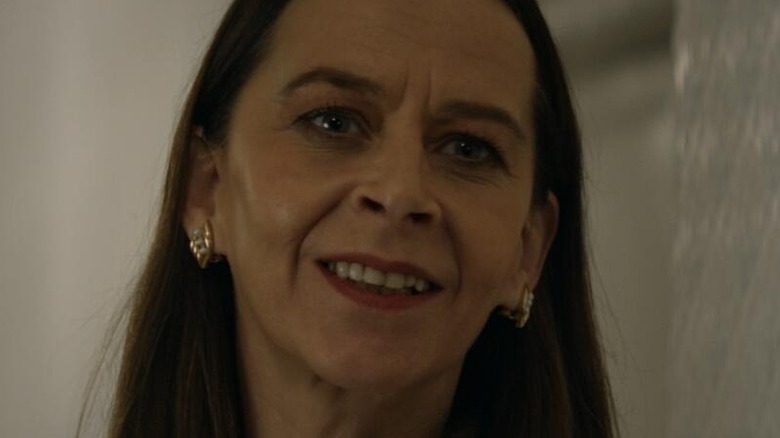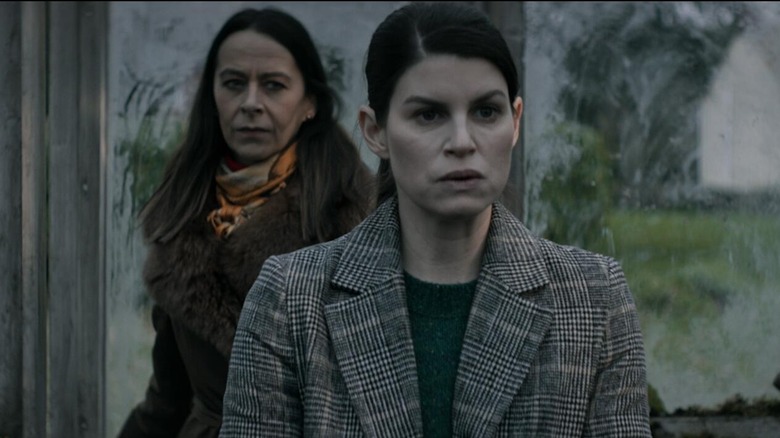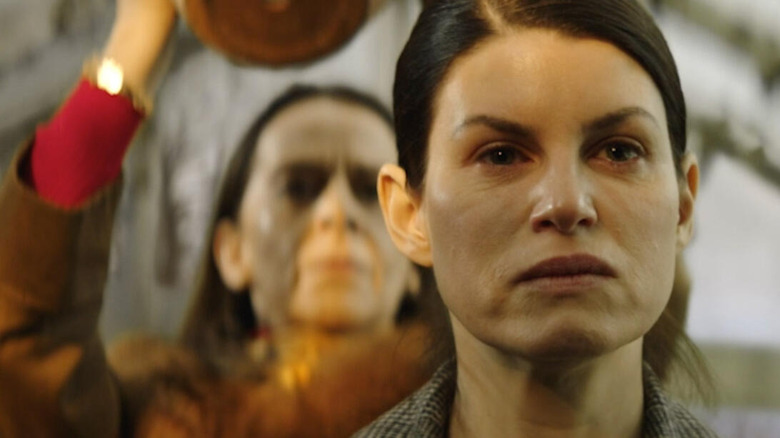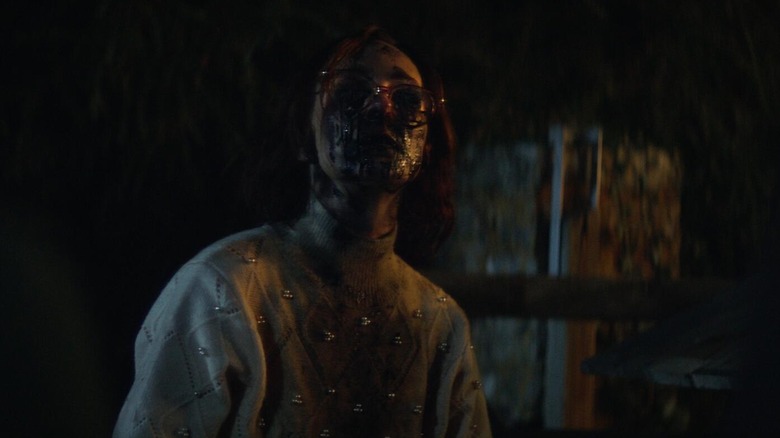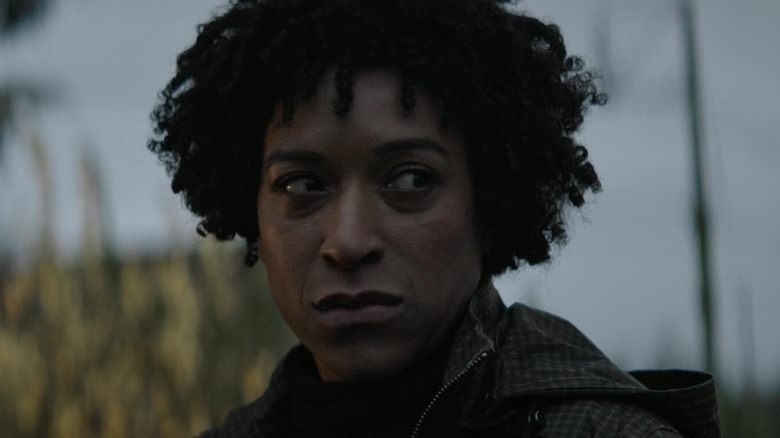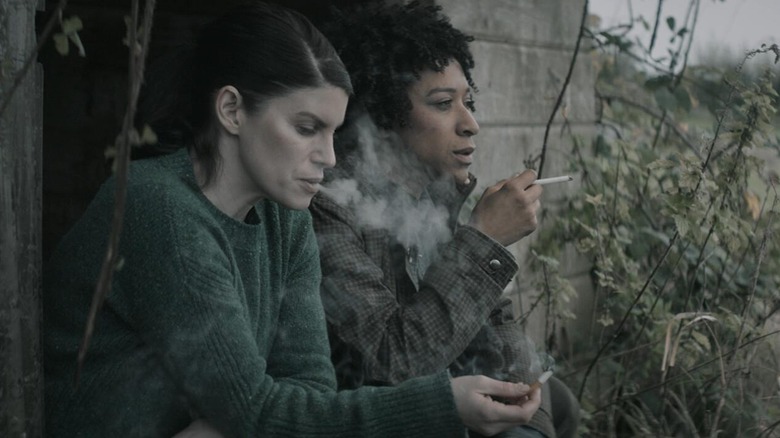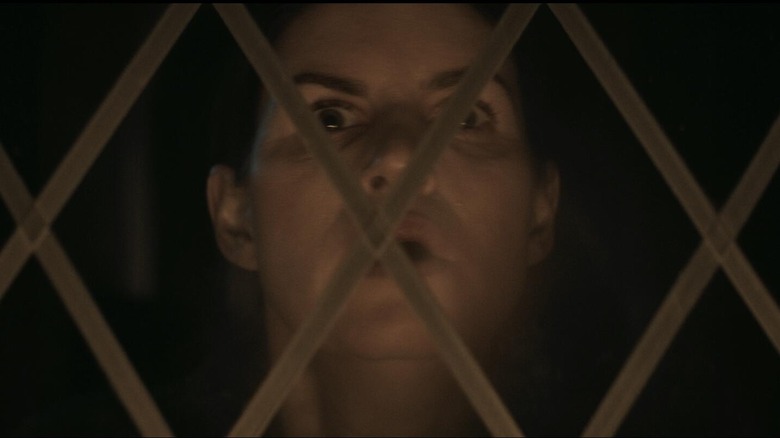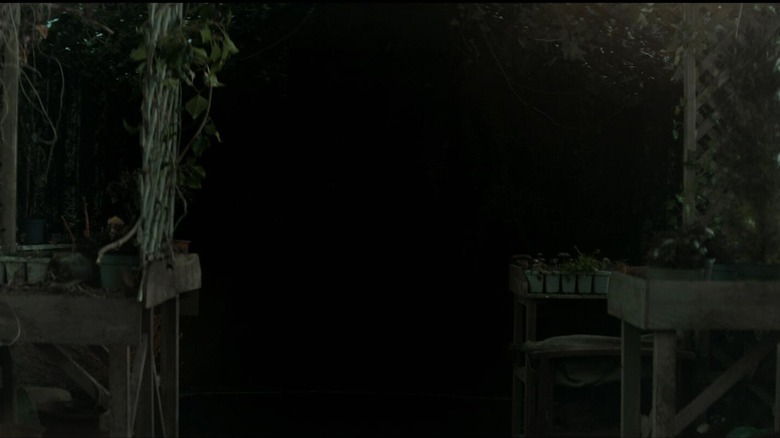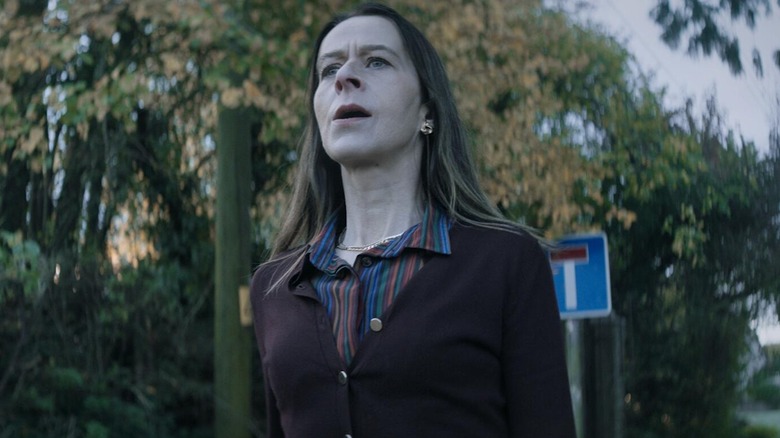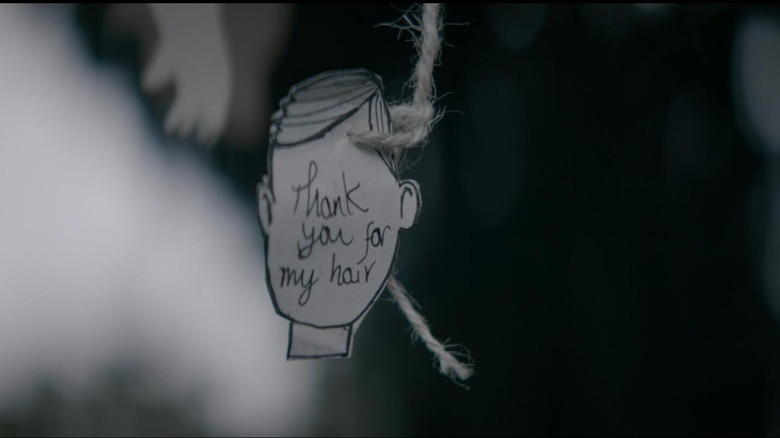The Ending Of Matriarch Explained
Horror fans in 2022 got a large, diverse crop of new scary movies in a wide range of subgenres, and while it didn't have the same major release rollout as some of its peers, Hulu's "Matriarch" stands as one of the more impressive small-scale horrors of that release year. The story of a woman who heads back to her hometown after surviving a near-fatal overdose and finds something strange has befallen both her mother and the whole village, Ben Steiner's film is an intriguing, intimate piece of folk horror that builds its own little world, then explores some very particular nooks and crannies within that world.
All of this builds to an ending that's both dark and satisfying, while also leaving plenty of questions and themes to mull over as the credits roll. So, how does the ending of "Matriarch" work, what happens to the characters, and what does it all mean? That's what we're here to talk about. This is the ending of "Matriarch" explained.
If you or anyone you know needs help with addiction issues, help is available. Visit the Substance Abuse and Mental Health Services Administration website or contact SAMHSA's National Helpline at 1-800-662-HELP (4357).
Laura in the marsh
"Matriarch" begins and ends with the image of a marsh. By the end, we know that the first figure to walk into the marsh and give their life is Laura's (Jemima Rooper) father and that he did it as a sacrifice to the "Queen of Rot and Rebirth" so that his wife Celia (Katie Dickie) could have a child.
At the end of the film, it's Laura herself who walks into the marsh, seemingly to die after freeing the dark goddess of the marsh from her mother's clutches and abolishing the strange system of worship of replenishment set up in the village after her birth decades earlier. By this time, Laura has accepted who she really is — the child of a dark goddess, and not a biological human born of man and woman — and has accepted that the woman who raised her was never going to truly love or understand her. It was all part of a dark bargain, and when the bargain went foul she became her mother's new bargaining chip.
Whether Laura walks into the marsh simply to die or to be reunited in some magical way with her true mother, we can't know. It's possible even Laura doesn't know. What she does know, though, is that all the pain of her life can be traced back to this marsh, so perhaps the only way to be rid of it is to return to the marsh itself.
A goddess is freed
Near the end of the film, when Laura realizes her mother's plan to return her to the strange godlike being from whence she came, she has a choice to make. The goddess, sensing her connection to Laura, doesn't want to consume her or kill her, which means the power Celia's been leeching from the being to maintain the village's populace can't be replenished. So Laura considers freeing the goddess, stopping Celia's power in its tracks, even as Celia warns that freeing the being will kill everyone in the village.
Laura's choice is to break the magic circle that keeps the goddess trapped in Celia's greenhouse, freeing the creature and thus dooming the town of falsely youthful villagers to rot away and die. The goddess vanishes into the ether immediately, happy to be free of the prison where she's seemingly been kept for decades, ever since Laura's father gave his life to bring the goddess to Celia's doorstep. Because "Matriarch" never goes into great detail about the being, we have no idea if she's returned to the same marsh where Celia's father died, or if she's gone elsewhere, or if she's simply given up any semblance of a physical form altogether. What is clear is that in her final moments onscreen, the goddess offered a choice of love to Laura in a way that Celia never did, which frees Laura to do what's necessary.
A rotten village
"Matriarch" doesn't spend much time spoon-feeding its own mythology to viewers, but by the end of the film, we have a rough sense of what's happened to the village of Laura's birth. Celia trapped the goddess who gave her Laura, imbuing herself with its power, and then essentially set herself up as the "matriarch" of the entire village, granting the wishes of her neighbors who came to worship her and drink her milk in exchange for youth, vitality, and cures for illnesses. In the end, we learn that only the local priest and his wife were left holding out from the new way of doing things and that the priest himself, Ken (Keith David Bartlett), has grown bitter and angry because of it. In the end, he learns that even his daughter Abi (Sarah Paul) gave in to Celia's influence so she could be cured of cancer.
Of course, with the goddess freed, Celia's power isn't the only thing that dries up. Because so many people in the village have lived under her influence for so long, they're also beginning to rot away because the goddess' power is no longer under Celia's control. That means virtually everyone in this particular town will rot away and die. We don't know how soon, and we don't know exactly where that leaves each individual person, but eventually someone is going to find this disaster, and the discovery of a new ghost town will rock the United Kingdom.
Abi's fate
"Matriarch" makes it pretty clear that most of the people in the village are going to die just like Celia, rotting away when the power of the goddess is no longer something they can draw from whenever they like. What's less clear is what this means for Abi, who took some of the goddess's power at some point.
Abi, who was Laura's childhood friend and sometime lover before Laura left town, had cancer at some point earlier in the story of the village, and though her father thinks she was healed through God's love, she later reveals she was cured by Celia, who gave her some of the goddess' power. But cancer eventually returns, leaving Abi to make a difficult choice and return to Celia for help again. At the time the film ends, she has not yet gotten her new dose of cure from Celia, and the recurrence of her cancer suggests that she has not been receiving regular doses all this time. So, does that mean that Abi will simply live on, dealing with her cancer in a normal, medical way rather than turning to the goddess? Will she attempt to seek out the goddess herself? She's one of the few characters in the story who's left in a genuine limbo by the end of the film, and it's fascinating to think about what she's lived through and how it will inform what she does next.
Children of the goddess
We know from the film that Laura's parents ultimately learned of some secret magical knowledge that led her father to sacrifice himself in the marsh, drawing out the goddess and convincing the being to "seed" Laura in Celia's womb, while also allowing Celia to trap the goddess and use her power. The film doesn't tell us much about how this happened, or how long it took Celia and her husband to figure it out, but it's clear that they're not particularly rich or powerful people in terms of how much they had to offer in the way of resources. They just figured out a path and took advantage of it.
This, of course, suggests two possibilities — both of them fascinating within the world of "Matriarch." The first and most immediate of these possibilities is that Laura's parents learned this secret because other people had already discovered and exploited it somewhere in the past, and therefore there are other children of the goddess out there somewhere. Perhaps someone in the past of this very same village figured out this secret and was able to pass it on. Perhaps it was buried in an old book Laura's parents found. Either way, it's quite possible (even probable) that this wasn't the first time someone struck a bargain with this goddess.
Other goddesses
The other possibility raised in "Matriarch" by the presence of the goddess, and the knowledge humans have gained of her, is that she's not the only goddess out there in the marshes of the United Kingdom, living according to the old ways and waiting for human worshippers to find their way to these old traditions.
One of the central themes of folk horror in general is this clash of the old and the new, the idea that once-powerful figures of nature and antiquity are still hidden out there in the landscape. "Matriarch" shows us that this is true in at least one marsh near at least one village, so why can't it be true for other marshes, groves, or grasslands elsewhere in the same country? Why can't it be true all over the world? That an entire town fell under the spell of a cult of personality spurred on by one woman's ability to hold a goddess in her greenhouse is frightening, but think about that on a grand scale, with little gods and goddesses everywhere, waiting to be wielded by the wrong person. That's an especially terrifying thought and one the film leaves viewers to ponder.
Keeping a secret
Everyone in the village, including his own daughter, eventually chose to embrace the goddess' power, but Ken remained the lone holdout, convinced that he was on the right side and doing his best to try and talk everyone else in the village out of their sinful ways. Despite everything, he was confident that God would eventually prevail, even going so far as to declare God was "coming back" to the village as it seemed Celia's power was waning.
Though we don't know his entire story, it's clear that Ken has been paying attention to the changes in the village for a long time and that he's remained true to his faith even after losing his wife and growing bitter and angry. All of this makes us wonder: Has he simply kept this secret all these years, continuing to try and preach to the people who used to be his flock even though they refuse to listen? Or, has he perhaps told someone else, perhaps someone in the church with whom he's remained close? Will someone come seeking answers for Ken now that he's gone?
Adoration
Even before "Matriarch" reveals the secret of the goddess and what's gone on in the village over the years, it's clear that Laura and Celia have a very difficult relationship brought on by what Laura has long viewed as mistreatment and abuse throughout her childhood. Though Celia's effort to lure her daughter back home is eventually revealed to be a ruse so she can sacrifice her back to the goddess, she also manages to reveal some very interesting truths about herself along the way.
In a moment of honesty, she confesses to Laura that what she really wanted, all along, was a sense of "adoration" from someone, and when her husband was gone and she realized she couldn't get it from her daughter, she found that adoration in the village. She built her own cult of personality thanks to her ability to keep the goddess captive, and even in her waning moments, when she realized it was all going to fade, she still craved adoration above all else. Celia's rise and fall is a study of the corrupting nature of power and hubris, and it's no wonder that, in the end, her need for continued adoration was her undoing.
God vs. gods
Ken spends much of the film as the lone holdout in a town that's long since given itself over to the worship of an ancient Earth goddess, using Celia as its new high priestess. Even as the film nears its end, and things start to get dire, he remains convinced that his God will win out, right up until he enters the greenhouse and sees the goddess languishing in her circle. Seeing the creature laid bare before him, revealing everything he thought he knew about Celia's power trip ran deeper than he ever imagined, Ken is overcome with despair. He dies by suicide rather than keep trying to fight, believing in the end that he was never right about God, that he'd misplaced all of his faith, and that he, therefore, had nothing left worth living for.
But of course, one of the big lingering questions of the film is whether or not Ken was right in that realization. God, at least in a Christian sense of the word, does not have a major presence in "Matriarch," but it's clear that Christian traditions are running up against something even older in the goddess. So, does that mean God isn't present, or that God is indifferent? This is a key part of the bigger, existential sense of terror running through the film, and the film's lack of an answer makes it even more frightening.
If you or anyone you know is having suicidal thoughts, please call the National Suicide Prevention Lifeline by dialing 988 or by calling 1-800-273-TALK (8255).
